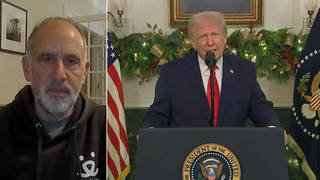
Topics
Guests
- Lee Fanginvestigative journalist at The Intercept covering the intersection of money and politics. He’s recently been reporting on the congressional debates around healthcare.
As the Congressional Budget Office projects 24 million people will lose health insurance coverage by 2026 under the Republican plan to replace the Affordable Care Act, we look at who stands to benefit from the law. Lee Fang, investigative journalist at The Intercept, talks about how the American Legislative Exchange Council (ALEC) and the for-profit medical industry is backing the plan despite opposition from health providers. Plus, we look at how the bill is just the first of a three-part plan to repeal Obamacare.
Transcript
AMY GOODMAN: As we continue to talk about healthcare, I also want to bring in investigative reporter Lee Fang of The Intercept. He recently wrote a piece headlined “Next Phase of Obamacare Repeal Will Target Mandate Requiring Prenatal Coverage, GOP Leader Tells Allies.” The article begins, “When Republican Congressman John Shimkus expressed outrage during a House committee hearing Wednesday 'about men having to purchase prenatal care' in their health insurance—the video clip of which caught fire on social media as an example of misogyny and cluelessness—he wasn’t going rogue. He was just getting ahead of party leaders, who haven’t publicly announced their next steps quite yet.” This is Shimkus making the comment after being questioned by Democratic Congressman Michael Doyle.
REP. MICHAEL DOYLE: What mandate in the Obamacare bill does he take issue with? Certainly not with pre-existing conditions or caps on benefits or letting your child stay on the policy to 26. So, I’m curious. What is it we’re mandating that you—
REP. JOHN SHIMKUS: Will the gentleman yield?
REP. MICHAEL DOYLE: Yeah, sure.
REP. JOHN SHIMKUS: What about men having to purchase prenatal care?
REP. MICHAEL DOYLE: What?
REP. JOHN SHIMKUS: I’m just—is that not correct?
REP. MICHAEL DOYLE: Reclaiming my time.
REP. JOHN SHIMKUS: And should they?
AMY GOODMAN: That was Republican Congressman John Shimkus. We’re joined right now by investigative reporter Lee Fang of The Intercept. Lee, explain.
LEE FANG: Hi, Amy. Thanks for having me.
Republicans have long argued that the Affordable Care Act’s consumer mandates—for example, in the Affordable Care Act there is the essential benefits package, this rule that mandates that all health insurance plans offer a basic basket of coverage items, that includes prenatal care, pregnancy care, mental health, hospitalization, ER drugs and lab work, that this essential package is included in every health insurance plan so that when you go to the doctor and you’re covered, your health insurance plan actually covers some of these basic needs that everyone essentially has. Now, in the bill that we’re looking at today, that the CBO scored yesterday, this is only phase one of the plan. The bill that Paul Ryan has proposed is essentially a budget plan. It doesn’t touch most of these consumer safeguards. It does kind of roll back some consumer safeguards for Medicaid, but for the larger healthcare market, for individuals and employer-based plans, there aren’t many changes. And that’s because this is a three-phase strategy.
The first phase of the strategy relates to the bill that Paul Ryan is proposing. That’s because what they’re using is a strategy called reconciliation. For any bill that’s proposed that reduces the deficit—and the CBO score confirmed yesterday that the Paul Ryan plan does reduce the deficit by over $300 billion over 10 years—given that score, it allows this bill to pass with only 51 votes, meaning that it can bypass a Senate filibuster. And Republicans, as long as they can keep their caucus together, they can pass this without any Democrats and send it to the president’s desk. But what’s interesting here, and what we kind of revealed using a strategy call that we obtained, Republicans are saying, “We couldn’t fit all the changes to Obamacare into this one phase-one strategy.” But later this year, after this bill passes, they will use executive action, use the powers of the Department of Health and Human Services, to try to roll back a lot of the consumer safeguards, going after the essential health benefits plan and other regulations. So, with Congressman John Shimkus complaining about paying for prenatal care, pregnancy care, he wasn’t just kind of riffing. He was actually potentially showing his cards, that Republicans do plan to go after these essential services, just not in this initial phase of the repeal effort.
AMY GOODMAN: Explain what ALEC has to do with this, the American Legislative Exchange Council.
LEE FANG: Well, The Intercept, along with a contributor, Nick Surgey, we obtained a strategy call on Thursday, right after the two main House committees that marked up this legislation. Republican leadership have gone out and tried to win conservative support for this legislation. So, this conference call that we obtained was a conference call with state legislative leaders that are a part of the American Legislative Exchange Council. This is a conservative advocacy group that brings together state lawmakers and lobbyists to come up with policy solutions. This is one of the few groups that has endorsed Paul Ryan’s legislation. This is also a group that’s funded by health insurance companies, drug makers and pharmaceutical companies, that has long lobbied against the Affordable Care Act and pushed for a lot of the proposals that you see in the Paul Ryan plan, particularly the block granting of Medicaid. So, this was a call, probably like many others, of the House Republican leadership in Congress calling state lawmakers to try to build support for their plan.
AMY GOODMAN: You also wrote a piece, Lee, which was “Paul Ryan Fundraised with Health Insurance Lobbying Firm Just Before His PowerPoint.” Explain.
LEE FANG: Yeah, that’s right. You know, this bill has a lot of losers—folks that are going to lose coverage because of Medicaid being cut, elderly individuals who will see, you know, their premiums skyrocketing under this plan. But, you know, as you mentioned earlier, it has a lot of winners, whether that’s the medical device industry, which was—are seeing a tax cut—all of the Affordable Care Act taxes are either repealed or delayed—or the sun-tanning industry. They receive a big tax cut under the Republican proposal.
But one of the biggest winners of this plan is the health insurance industry. And, you know, as we’ve been reporting, the big health insurance lobby met last week as this bill was moving quickly through Congress. Even on Thursday, after the bill was passed through markup, Paul Ryan, of course, got a lot of media coverage, because he had a long press conference and a PowerPoint presentation when he was trying to sell this plan. But what we found out was that just prior to that press conference, Paul Ryan was fundraising with a lobbying firm that represents the health insurance industry, $10,000-per-person-type event raising money for Paul Ryan’s joint fundraising committee that he uses to elect House Republicans. And all throughout the week, we’ve seen congressional Republicans meeting with health insurance companies. America’s Health Insurance Plans—that’s the trade group for the biggest insurers—they met with Washington and met with Kevin Brady, the Republican chairman of the tax Ways and Means Committee.
And again, I just want to emphasize that insurance companies, in so many ways, are the big winners of the bill. They receive specialized tax cuts, because the Affordable Care Act financed itself with a special tax on the health insurance industry at large. The Affordable Care Act had a limitation on tax deductions for health insurance CEOs and other executives. That gets rolled back, as well as the other taxes. And as you were talking about earlier in the program, this Republican proposal allows a greater level of age discrimination, so you’re going to see elderly Americans paying more than $10,000 a year in higher premiums. At the same time, if you look at how that kind of affects the health insurance market, the Republican proposal encourages younger, healthier people to enter the health insurance market, at the same time they’re pushing older, sicker Americans out of the market. So that can stabilize costs and boost profits for insurers. So, if you look just down the line, whether it’s the regulatory changes or the tax changes or even the conversion of the individual mandate—instead of the government collecting a fee when people go without health insurance, now health insurance companies can charge a surcharge of 30 percent on people’s premiums if they lose healthcare and then try to get health insurance again from going uninsured. So, health insurance companies are the big winners. And they’re not only lobbying, but they’re providing a lot of campaign fundraising support for Republicans pushing this plan.
AMY GOODMAN: Lee, you have written over the years a lot about single payer, Medicare for all. As we wrap up today, can you talk about why this isn’t being raised at this point?
LEE FANG: Well, look, you know, for this Republican plan, we see kind of a division in industry. Medical device companies, health insurance companies support it. But hospitals and many doctors’ groups oppose it because of the Medicaid cuts. But, you know, for a big plan like single payer, Medicare for all, we’ve seen over the years, every time this type of proposal is brought up, that actually unifies the for-profit healthcare industries in America, because they’re trying to protect a system that, frankly, benefits them. Look in Colorado just last year. There was a ballot proposal to enact single payer in that state, and the healthcare industries at large unified to lobby against that plan, to fund the opposition. And it was crushed. So, you know, moving forward, we don’t see many Democrats proposing an alternative, whether it’s the, you know, public option or Medicare-for-all-type plan. Again, that’s because many of the big healthcare industries in America, they play both sides of the aisle. They provide a lot of money to Democrats, as well.
AMY GOODMAN: Lee, I want to thank you for being with us, Lee Fang, investigative journalist at The Intercept covering the intersection of money and politics. And we’re going to link to your articles at democracynow.org.













Media Options